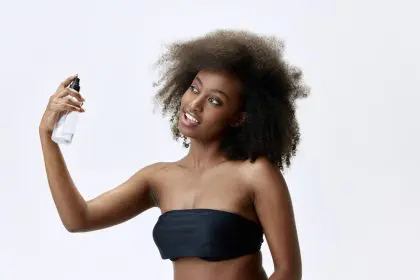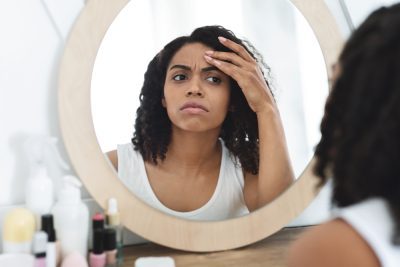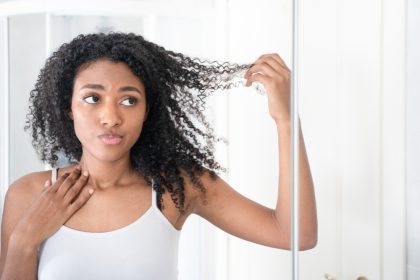In the high-stakes arena of corporate America, millennial Black women are waging a silent war — not for corner offices or stock options, but for the right to be themselves. A groundbreaking study has pulled back the curtain on this daily struggle, exposing a beauty battlefield where natural curls and cultural identity clash with the ruthless demands of “professionalism.”
The beauty battleground: Personal vs. professional
Picture this: It’s Sunday evening, and a young Black woman stands before her mirror, hair wrapped in a vibrant headscarf, skin glowing with the rich moisturizers passed down through generations. Fast-forward to Monday morning, and that same woman emerges from her apartment, hair straightened within an inch of its life, makeup carefully applied to “tone down” her features. This isn’t a makeover show gone wrong — it’s the reality for countless millennial Black women navigating the treacherous waters of workplace beauty standards.
Jaleesa Reed, an assistant professor of human-centered design, has dared to dive deep into this complex world with her study, “Millennial Agency and Liberation Within Black American Beauty Standards.” Published in the volume “Embodiment and Representations of Beauty,” Reed’s research gives voice to 20 millennial Black women born between 1981 and 1996, uncovering a tale of two beauty standards that would make Dr. Jekyll and Mr. Hyde seem well-adjusted.
The great divide: Embracing roots vs. climbing ladders
In their personal lives, these women are the embodiment of #BlackGirlMagic, celebrating the kaleidoscope of hair textures, body shapes, and skin tones that make up the African diaspora. They rock protective styles with pride, embracing the cultural legacy woven into every braid and twist. But come Monday morning, it’s as if they step through a portal into a parallel universe — one where success is measured in shades of beige and inches of straight hair.
“To meet American beauty standards often means adhering to ideals associated with being ‘White,” ‘thin,’ ‘blonde,’ and ‘blue-eyed,’ ” Reed’s study reveals. It’s a beauty standard that reads like a casting call for a 1950s sitcom, leaving little room for the rich diversity of Black beauty.
For these women, the decision to wear a bold lip color or let their natural curls flourish isn’t just a matter of personal style – it’s an economic gamble. As Reed puts it, “Decisions around how to style their hair, what jewelry to wear, or how much makeup to put on are tied to their economic livelihood and their ability to support themselves and their families.” It’s a high-stakes game of “Guess Who?” where the wrong move could cost you your paycheck.
The Eurocentric elephant in the room
The study lays bare the insidious influence of Eurocentric beauty standards, which have sunk their claws deep into the corporate psyche. These aren’t just arbitrary preferences — they’re the ghosts of colonial past, haunting boardrooms and break rooms alike. Participants in the study shared war stories of Black women who dared to defy these unwritten rules, facing everything from side-eyes to straight-up discrimination.
“Participants were aware, from personal experience and anecdotes, of repercussions for Black women who did not ascribe to the appearance expectations at work,” Reed notes. It’s not paranoia if they’re really out to get your hair, right?
The numbers back up these experiences. The 2019 C.R.O.W.N. Research Study dropped a statistical bombshell: Black women in the U.S. are 1.5 times more likely than their peers to be sent home from work due to their hairstyle. It’s like a twisted game of “Red Light, Green Light” where the rules are based on hair texture.
Cultural crown or career killer?
For many of the women in Reed’s study, embracing their natural beauty in predominantly white workplaces feels like playing Russian roulette with their careers. The choice between a protective style and a promotion isn’t just unfair – it’s downright Orwellian.
“Hairstyle choices for professional spaces are laden with cultural meaning and likely to be misinterpreted,” Reed writes, highlighting the profound disconnect between Black cultural expression and corporate comprehension. Cornrows, twists, and locs — styles that have adorned Black heads for centuries — are suddenly deemed “unprofessional” under the fluorescent lights of office buildings.
It’s a catch-22 that would make Joseph Heller’s head spin: express your cultural identity and risk your job security, or conform and lose a piece of yourself in the process. For Millennial Black women, every workday is a high-wire act, balancing on the thin line between authenticity and employability.
The CROWN Act: A legislative clapback
But the tide may be turning, thanks to a wave of legislative action that’s giving HR departments across the country a much-needed wake-up call. Enter the CROWN Act (Create a Respectful and Open Workplace for Natural Hair), the legal equivalent of telling workplace discrimination to “say it to my face.”
Since California kicked off this hair revolution in 2019, 28 states have jumped on the CROWN Act bandwagon, with more lining up to join the party. It’s a start, but let’s be real — we’re still talking about laws to protect people from being fired over their natural hair in 2024. If that doesn’t scream “we’ve got work to do,” I don’t know what does.
The road ahead: From conformity to celebration
As Reed’s study makes clear, the struggle for Millennial Black women in the workplace is far from over. Every morning, these women stand before their mirrors, armed with straighteners and concealers, preparing for battle in a war they never asked to fight.
But there’s hope on the horizon. As more voices join the chorus demanding change, and as legislation like the CROWN Act gains traction, we’re inching closer to a world where Black beauty isn’t just tolerated in the workplace — it’s celebrated.
The journey from conformity to celebration won’t be easy. It requires more than just changing laws; it demands a seismic shift in cultural attitudes. But if there’s one thing Millennial Black women have proven time and time again, it’s that they’re more than up for the challenge.
So here’s to the women who refuse to dim their light, who push back against outdated beauty standards, and who show up authentically day after day. Your struggle is seen, your resilience is admired, and your beauty — in all its natural, unapologetic glory — is revolutionary.












